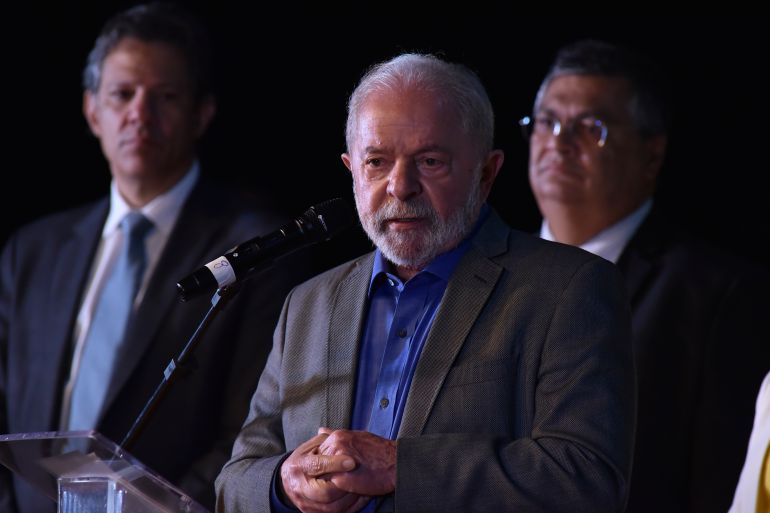Brazil’s President-elect Lula names incoming cabinet ministers
Lula names Workers’ Party ally Fernando Haddad as finance minister, among other top posts in incoming administration.

Brazilian President-elect Luiz Inacio Lula da Silva has unveiled the first cabinet picks of his incoming administration, including for key posts such as foreign relations minister, finance minister and chief of staff.
Speaking from his transition team’s headquarters in the capital, Brasilia, Lula on Friday announced that close ally Fernando Haddad, the former mayor of Sao Paulo, would become his finance minister.
Keep reading
list of 3 itemsAt COP27, Brazil’s Lula vows halt to rampant deforestation
Brazilian judge rejects attempt to overturn Lula election victory
He also chose career diplomat Mauro Vieira as foreign minister, former congressman Jose Mucio as defence minister, Bahia Governor Rui Costa as chief of staff, and the ex-governor of Maranhao state, Flavio Dino, as justice minister.
“When you mount a government, you look at Brazilian society as a whole,” Lula, who is set to take office on January 1, later wrote on Twitter.
“The [ministers] announced today are people qualified to perform the job. We will have other ministries with women, Black men and women, and Indigenous people. We will have a government with the face of Brazil.”
In October, Lula – a popular left-wing candidate representing the Workers’ Party (PT) – narrowly prevailed over far-right incumbent Jair Bolsonaro in a run-off presidential election that saw him earn 50.8 percent of the vote compared with 49.2 percent for Bolsonaro.
Despite unfounded accusations of election fraud from Bolsonaro’s party, Lula’s election was confirmed by the country’s highest election authority, the Superior Electoral Tribunal (TSE).
Lula had previously served as Brazil’s president from 2003 to 2010. But he was convicted in 2017 on corruption charges and money laundering, and his bid for the presidency in 2018 was cut short when he was arrested.
His running mate at the time, Haddad, took his place in the election, ultimately losing to Bolsonaro in a run-off.
The criminal convictions against Lula were annulled by Brazil’s Supreme Court in 2021, opening the door for Lula to launch his successful presidential campaign this year.
As he prepares to begin his third term as president, investors have expressed fears over his economic policy, calling for firm rules for public spending.
In November, Lula’s transition team approached Brazil’s National Congress with a multibillion-dollar plan to increase social spending, including a budget carve-out for welfare spending, a minimum-wage hike and greater funds for healthcare.
Lula has vowed to prioritise social spending over fiscal restraint, calling it his mission to address poverty and ensure “every Brazilian has had coffee, lunch and dinner again”.
“There is no point thinking only about fiscal responsibility because we have to start thinking about social responsibility,” he said.

Haddad, Lula’s finance minister pick, is a lawyer with a master’s degree in economics and a doctorate in philosophy. Perceived as a moderate within the Workers’ Party, Haddad was part of Lula’s first term as president in 2003, serving in the planning and budget ministry.
He later became education minister for six years, before successfully running for mayor of Sao Paulo, Brazil’s most populous city. During his time in office there, from 2013 to 2016, he renegotiated the city’s debut with the federal government, reducing it by about $9.52m (50 billion reais).
Sergio Vale, a chief economist for the consultancy MB Associates, expressed concern about Brazil’s financial stability under Haddad.
“This government’s level of concern for the following years’ expenses isn’t clear yet. Haddad has less commitment to fiscal matters than what the market expects, and less dialogue with Congress than [Lula’s] former ministers,” Vale told The Associated Press news agency.
Lula’s budget plans still have to pass both chambers of Brazil’s Congress in order to go into effect.